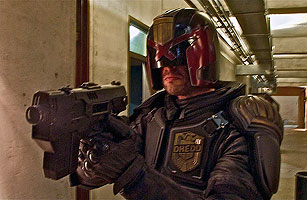
The creators of the british comic strip Judge Dredd imagined Mega-City One as a colossal metropolis in the postapocalyptic near future stretching from Boston to Washington, home to 400 million people living in 200-story blocks. Baden Powell Drive is a highway linking South Africa’s historic wine country and the tin-shack township of Khayelitsha outside Cape Town, with wide verges favored by prostitutes and goats. Yet here, in four giant hangars by the roadside, a crew and a cast of hundreds are making Dredd, which they hope will be one of next year’s biggest action movies. Why here? “There are only a few places in the world that can handle this kind of movie,” says Dredd’s British co-producer Andrew MacDonald, whose credits include Trainspotting, The Beach and The Last King of Scotland. “South Africa is comparable to any of them.”
You’ve likely seen a lot of South Africa in the past few years, much of it unknowingly. Clint Eastwood’s Invictus , with Matt Damon and Morgan Freeman, was set in South Africa and, naturally, shot there, as was much of Blood Diamond , with Leonardo DiCaprio. But Lord of War , with Nicolas Cage as a gunrunner? Those West African war zones and shots of Lebanon and Colombia are actually sets in South Africa. Flashbacks of a Fool with Daniel Craig? That Malibu beachfront is Cape Town’s Atlantic coast. HBO’s Iraq-war series Generation Kill ? That desert is South Africa’s northwest. South Africa has also doubled for the Urals in 10,000 B.C. ; 17th, 18th and 19th century America in the Discovery Channel opus America: The Story of Us; and much of the rest of the planet in 2009’s globetrotting Amelia, which starred Hilary Swank.
Versatility and convenience of location — all those landscapes are within a few hours’ drive of Cape Town — are keys to South Africa’s moviemaking appeal. So is cost. By making Dredd in South Africa, where a nonunion cast and crew is cheaper than it would be in Europe and the U.S. and the government rebates up to 25% of production costs, MacDonald says he can make “something that will look like $100 million” for less than half that figure. Dredd co-producer Michael Murphy concurs. “South Africa is in the business of making movies that cost half as much as they look,” he says.
But if South Africa were just another example of win-lose outsourcing in which production is offshored to cheaper parts of world, Hollywood’s love affair with Cape Town would last about as long as it takes for the next low-cost location to emerge. There is reason, however, to hope the spotlight will linger longer on South Africa: skills. The surprise hit of 2009, the aliens movie District 9, was made by a South African cast and crew and demonstrated hitherto unnoticed talent in the nation’s 25,000-strong, $1 billion-a-year film industry. The film was, says MacDonald, a “game changer. A lot of people began paying attention to South Africa after that.”
Dredd should only enhance that reputation. It is the first movie to be made at the new Cape Town Film Studios, a 17,000-sq-m complex of four soundstages, offices, set-production warehouses and a cinema on Baden Powell Drive. To give an indication of how up-to-date those facilities are, Dredd will be a rare example of a 3-D action movie, as opposed to the much more common 3-D animation film. MacDonald says that though he imported 40 foreigners, the bulk of the crew were Cape Town’s own. Building on that name for quality, Nico Dekker, CEO of Cape Town Film Studios, plans an academy for young African filmmakers and a technical academy on his lot, while across the highway in Khayelitsha, a new animation academy endorsed by the British creators of Wallace and Gromit enrolled its first 120 students this year.
South Africa’s new role as Hollywood’s hottest back lot reflects how perceptions of the country and the continent are changing. That new image is even finding its way onscreen. March saw Ryan Reynolds and Denzel Washington wrap another action movie in Cape Town, Safe House. The film, originally slated to be set in Brazil and merely shot in South Africa, was rewritten so Cape Town could finally stop serving as a double and, for once, be cast as itself. Denis Lillie, CEO of the Cape Film Commission, says he expects more of that in the future. Like Los Angeles or New York, Cape Town is a naturally cinematic city, he says. “You have Table Mountain, the sea, the city, the townships. And it’s a very soulful place. A lot of the stars get off the plane, touch the soil of Africa and discover a real connection.” Sounds a lot like movie magic.
See the top 10 movie gimmicks.
See pictures of the African plain at night.